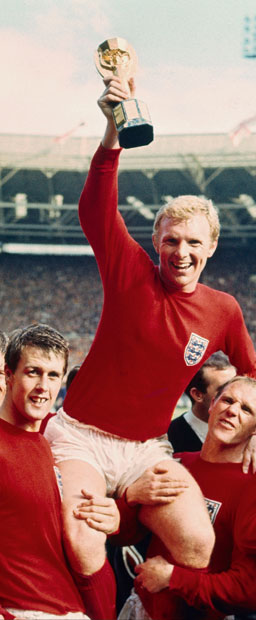Nothing illustrates the transformation in the working lives of professional footballers since the end of the maximum wage better than the story of how Bobby Moore only just made it to the West Ham ground for his first team debut against Manchester United. Today the players arrive from their luxury mansions insulated from the world in a Lamborghini or Maserati a few hours before kick-off to be pampered by an army of physios, clinicians, sports scientists and dieticians.
Young Bobby had to catch a bus from his parents’ home in Barking to travel the three miles to Upton Park along with thousands of fans going to watch him play. Indeed there were so many that the Hammers left-half found himself at the back of a long queue at the bus stop. He was too modest and polite to push in at the front. When he eventually arrived at the ground a police constable refused to allow him through the main gates because the ground was full. A club official had to be called across to take him straight to the dressing rooms.
As Matt Dickinson remarks in this absorbing biography, although George Best was only five years younger, the difference between those born during the war and the baby boomers like Best was profound. Moore always looked like he was ‘of the Spitfire generation with his creased slacks and neat parting’.
The only child of God-fearing teetotallers, Bobby was so punctilious that his dislike of heading the ball (a considerable drawback for a centre-half) was ascribed to its untidiness. Like David Beckham, a successor as England captain and fellow Eastender, Moore was a perfect role model. The blond hair, the dimples, the straight back and the demeanour of honest, wholesome endeavour; as Michael Caine said, if you had held auditions for the job of England captain you would have chosen Moore without even seeing him kick a ball.
Dickinson sets out to capture the entire personality of a man who was a mystery even to his close family. Moore managed to combine being head boy with chief miscreant to the frustration of his managers, particularly Ron Greenwood and Alf Ramsey, neither of whom would have been out of place in the higher reaches of the Anglican Church. Ramsey was a famously reserved manager who the players (including Moore) discreetly mocked. (When he told Rodney Marsh before a match that he’d pull him off at half-time, Rodney said he’d look forward to it — at Manchester City they only got an orange.)
Moore’s predilection for alcohol didn’t begin after he became the first and (so far) only Englishman to lift the World Cup. Shy and nervous, it had begun much earlier as a way to loosen up and ‘throw off the overcoat of reserve’. There’s much revealed about late-night escapes through hotel windows by players determined to enjoy a night out with or without the manager’s permission: Moore, the skipper, was also the ringleader.
Nothing can detract from his talent; his ability to read the game, to make the telling intervention and turn it into an attacking opportunity. As Dickinson says, while everyone applauds Geoff Hurst’s famous goal in the last minute of extra time when the crowd thought it was all over, few recall that it was Moore who supplied the telling pass out of defence.
In 1970, if Banks made the greatest save of all time, Moore made what must have been one of the greatest tackles — against Jairzinho of Brazil ‘like Superman stopping a runaway train’. That description is typical of Dickinson’s vivid prose. But he also calls on the greats of sports reporting such as Geoffrey Green, Hugh McIlvanney and Ken Jones to paint his picture of a magnificent player who never managed to make the most of his opportunities.
Moore’s decline and fall — he died in 1993, aged 51 — was tragic and a world away from Beckham’s post-playing days. After playing in the Danish third division and disastrous managerial spells at Oxford City and Southend, with his marriage dissolving and his finances in chaos, he takes whatever he can get and ends up as a columnist on the Sunday Sport, no doubt berating the untidiness of it all. The final humiliation was to be asked to leave Upton Park because he was watching a match there without a ticket. He never went back.
Available from the Spectator Bookshop, £17. Tel: 08430 600033. Alan Johnson’s latest memoir, Please, Mister Postman, is published this week. He is a former home secretary, as well as a former postman.






Comments